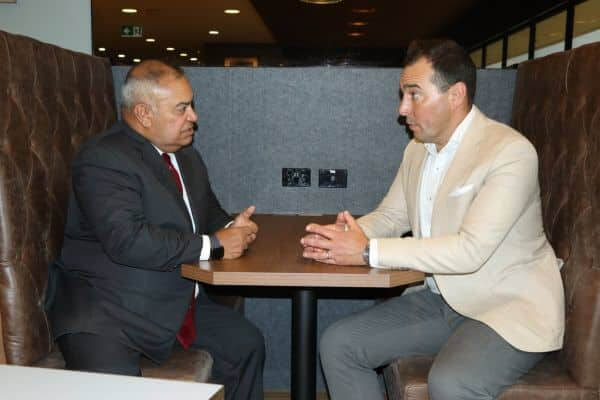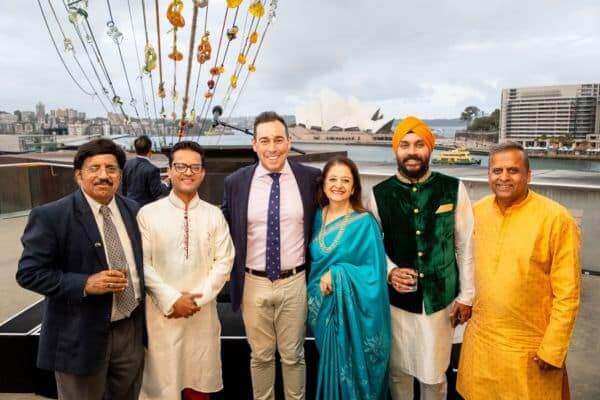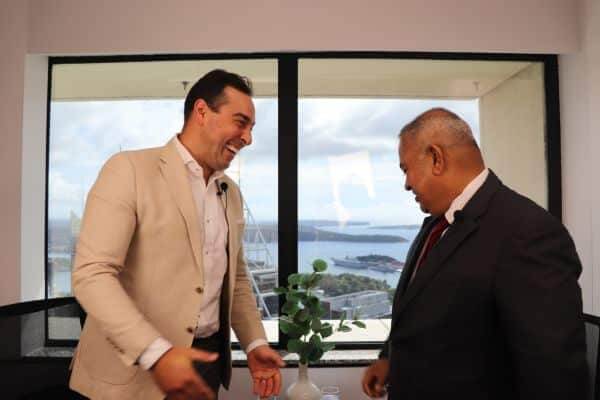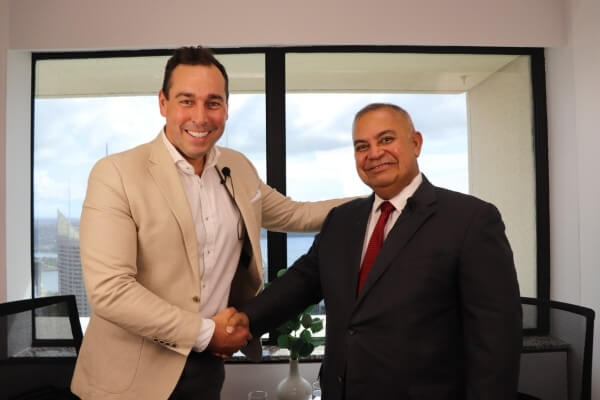Joseph La Posta, CEO of Multicultural NSW, has spent years at the forefront of fostering social cohesion in one of Australia’s most diverse states. With nearly one in three NSW residents born overseas, the conversation around multiculturalism, unity, and belonging has never been more relevant. In a time of heightened global tensions, the rise of misinformation, and deepening societal divisions, his insights into what strengthens – and threatens – social harmony are especially timely.
Joseph, during your tenure as CEO of Multicultural NSW, you have spent time with people of many different countries, faiths and cultures. What have you learned about your fellow creatures?
Joseph La Posta: That is a great question to start on, because the vast majority of people that I’ve worked with, all want the same things. They all want prosperity for their family, and to feel safe. By and large, they are very focused on the education of their children. Many people I get to work with, Pawan, are like you, migrants that have come here and are seeking to create the best life they can. As a consequence of that, they often have very high standards for themselves and their families in terms of how they conduct themselves. And they want nothing more than to be part of a thriving society where everyone can achieve its fullest potential.
So all is good, unless it goes wrong. What makes it go off track?
Joseph La Posta: One of the things that’s become increasingly apparent over the seven years that I’ve been in the role, is how connected we are as a society. More than ever, we are consuming news coming directly through to our pockets, in terms of the devices we carry. I think back to when my family migrated to Australia from Italy, the only way they could consume news from Italy was through a very large satellite dish that was arguably, probably not erected with council approval, but which connected them to one or two television stations back in Italy. Today all of us can consume our media (so much more directly). And because of how the algorithms etc are constructed, that has a significant influence in terms of the material that’s directed to us. And in a society like ours, where we’re trying to connect people to a common bond or purpose, whether that be the laws or the values of this country, that’s an increasingly challenging job. Because people are exposed to different perspectives, sometimes polarizingly different. Our job is to try and bring those views together so they can exist harmoniously in NSW.
MORE IN PAWAN LUTHRA PODCAST: Mark Waugh on The Pawan Luthra podcast
It’s been 50 years since Prime Minister Gough Whitlam referred to Australia as a ‘multicultural nation’. If you had to write a 50-year report card for the former Prime Minister, what would you list as three achievements, and three items still to do?
Joseph La Posta: That is such a fascinating question. NSW, with a population of roughly 8 million people, now has almost 1 in 3 of us born overseas, more than 1 in 4 of us who can speak two or more languages, and 1 in 2 of us with a parent born overseas. This means that if we didn’t go through Gough Whitlam and that multicultural experience and openness, Australia wouldn’t exist today in the form that we’re accustomed to. Because the reality of the situation is, and I think it was Arthur Caldwell, the immigration minister in 1945, who said to Parliament, we either populate or we perish as a society, because we don’t have the birth rates to sustain our population. And that’s increasing today – the average woman is having somewhere between 1.6, 1.7 babies. It’s just not enough – we have to complement our organic population growth with immigration and migration. And I think that’s profoundly been a positive.
Second, if you look at our society, some of the most interesting and iconic physical and social constructs have come from our migrants. You think about people like Harry Seidler for example, and some of our buildings, the construction companies that have come here. Even today, businesses like Deicorp for example, are founded on migrant roots and heritage, which they’ve contextualised to Australian society and done incredibly well. The fact that we’ve allowed so many migrant businesses to flourish and to exist is a great strength and has only helped boost our economy.
And third, when we get it right and we create the right frameworks for our young migrant families. We have doctors, heads of industry, professionals flying around the world, sharing their best practise from their education. The talent that has emerged from this social experiment of being a multicultural society has meant that we’re probably the best innovators in the world.

The three things that will be our handbrake are, one, we start seeing difference or diversity as a negative. There’s a particular rhetoric at the moment as we head into elections, about shutting borders, lowering international students, closing our minds to immigration. Of course, it’s a balance, but we should never close it.
Second, it is very easy for us to accentuate our differences. And that’s why we need a collective discourse that reminds people that it’s okay to have different opinions, but it’s not okay to ever breach the Australian law, and also be collectively responsible for what it is that binds us in terms of our shared existence here and the values of this country.
Third, when things go wrong, such as the pandemic, we’re very quick to blame others for that. And that can manifest in terms of hate and racism. We’re seeing some of that in our society today. When people are doing it tough, they’re looking for others to blame. We can never go back to a space like Germany of the ‘30s and ‘40s, where we go through tough times and we blame a group of people that are different from ourselves.
Are we having enough conversations about the positivity of multiculturalism?
No.
Why not?
Joseph La Posta: Because I don’t think positivity sells in the media landscape. And that’s a challenge for us. I think also, the challenge for many social justice and social agencies is they’re so focused on turning the lights on their very existence, that they’re not focused on how to uplift those small voices and really project them beyond.
MORE IN PAWAN LUTHRA PODCAST: Jay Sharma on The Pawan Luthra podcast
Now Joseph, Meta has announced that they’re removing the fact-checking options on their platforms. Elon Musk of X has stated that free speech is the bedrock of society. Meanwhile, ASIO has warned about the rise of far-right elements as a result of these changes. How can we balance freedom of speech with protecting individuals from harm?
Joseph La Posta: That one’s well above my pay grade. With Meta my understanding is the fact checking is still there until the end of this year. It’ll be interesting to see what content is then allowed. From a personal perspective, I have hopped off X. I really enjoyed being on it – it was a great way for me to share some of the successes of this and previous jobs, and connect with different people. I began to find there was so much content that was really unsettling. And that content just seemed to feed and feed. But look, you’ve got your individual obligation to yourself. You can’t rely on companies and how they behave to guide how you behave.
Can this not make your job as CEO of Multicultural NSW more difficult, with the current divisions in society, and people believing in things they want to believe in, rather than having rational discussions?
Joseph La Posta: That’s why it’s so important that you have an education (that guides you to) consume divergent media sources. If I want to understand an issue on say challenges in a different part of the world, then it’s not incumbent upon me just to go to one media source and use that as the source of truth. How can I get potentially different perspectives that will balance my view? That requires considered effort.
I think it’s also about having trusted media sources and media partners. With respect to Facebook, I don’t think it was ever invented as a media platform or source of truth. Sure, there are humbling and touching moments – between friends and family – and that’s a tick. Equally, there’s a lot of negative on there – you only have to see some of the posts that your outlet puts up that are very balanced and people will shout at you through the comments. I believe it’s incumbent upon us to acknowledge that freedom of speech should have limitations and barriers. We’re having this very conversation at the moment at NSW Parliament about race hate laws and so forth, about what constitutes hate speech and where do we draw the line in terms of freedom of speech versus hate speech. It’s going to be an interesting debate for our politicians.
As the CEO of Multicultural NSW, do you believe the hate speech laws – as they are – go the distance to be effective, or should they be tighter?
Joseph La Posta: Well, the Premier’s been really strong in his view on this. He believes that some of the actions that have occurred in recent months have not happened in a vacuum, and have started as a hate speech narrative that has evolved into people acting out on the hate instilled in them. I can understand why he has that position. In terms of whether the laws go far enough, in any law you’ll have people that say they’re going too far, and other people that say they’re not going far enough. The other challenge with laws is you need to make sure that they’re a law that can govern for all of society and not just for a moment in time.
In the last 18 months there has been a rise of antisemitism. International and local events and the amplification of hate speech through digital platforms, have led us here. In a state which is proud of its multicultural fabric, how has this issue gotten so much out of control?
I think emotion is overriding how people behave. The challenge for us today is when we’re constantly exposed to media sources that are looking to bring out or stir emotion, then we need to be really mindful that it doesn’t govern how we behave. I think some of the members of our society have consumed overwhelmingly, incredibly negative and disturbing media in the last 18 months. As a society right now, that’s the part that’s being tested – our ability to want to listen to different perspectives. Now that is incredibly hard at the moment. Right now, if you’re a member of our Australian Jewish community, you feel incredibly threatened.
I was incredibly proud of our Hindu community, the Turkish community, Chinese community, and others that extended themselves to say, right now you are a brother and sister. Your faith is almost inconsequential, and we won’t tolerate people that are trying to divide us as Australians over our different faiths or our different cultures.

The internationalisation comes through, Joseph, as we just touched on. We’re all aware of the situation. Do we need to be more vocal in assuring our communities – of whatever faith – about the virtues of a multicultural state and the beauty of our cohesive society over here?
Joseph La Posta: Your point’s well-made there: what’s your obligation and responsibility if you’re a local or a state member of Parliament? Your local or state responsibility is to unite people across their differences. It’s not necessarily to weigh in, to say a two-state solution or a one-state solution’s right, or Donald Trump’s right. It’s to say to the people here, that the people there, are their mothers, their children, their fathers, their daughters, their cousins. Where is our collective compassion and care for people regardless of what side of the border they’re on? Why is something that happens on one side of the border okay to you, but if on the other side, it’s not okay? It’s not necessarily about having a view in terms of foreign politics – that’s for the Commonwealth government; it’s more about our local and state politicians reminding people of the differences that’s here and now.
Our Jewish community’s been here for over 200 years. It’s incredible, the contribution they’ve made to our way of life. I don’t think we can lose (sight of) that right now.
There’s members of our Palestinian, Arab and Middle east communities that are also suffering. And showing care and compassion to either of those sides shouldn’t be seen as a negative, in my opinion.
I agree. Don’t you think the government needs to do more, to put their arms around both sides?
Again, your point is a fair one, Pawan, but the challenge right now is, you’ve got a community that’s received unprecedented levels of threat and attack. It’s the responsibility of the government to meet that, to deal with it in terms of the full strength of its law enforcement, try and reassure that community to feel safe and not isolated. It’s only a matter of time, Pawan, before you see a narrative shift. Once that community feels safer, it’ll then be about bringing everyone back together, encouraging those intercultural, interfaith relationships and trying to unite more people.
What do you see as challenges for Multicultural NSW, and yourself, in 2025?
I think overwhelmingly people are trying to make the dollar stretch further than they ever have before. The reality is, once people start to have less financial burdens and pressure on them, interest rates, inflation, these sorts of things start to regulate, people will start to open up and remind themselves that we’re actually pretty lucky to live in Australia. Of course, there’s times where we’re doing it tough but we are blessed to live where we live. Look at the quality of our living standards and our ability to even have interesting, democratically different conversations like this one – that’s a luxury in other parts of the world.
I also think there’s a part of our Australian psyche right now, that we’ve got to look after each other. I believe we as citizens also need to show a sense of internal humility. That is particularly problematic when you’re coming into an election cycle where the parties are trying to endear themselves to groups and voters.

Do you expect these elections to be polarising? More so than before?
I love you asked this question because we as an agency have an obligation to write a report to Parliament each year on the state of community relations. And one of the headlines of our report last year was how democratically respectful Premier Minns and former Premier Perrottet debated that last election. And it honestly came down to policies, and to your personal preferences in terms of the leaders. But the way they respected each other and their families – they actually reinforced that they liked each other – that’s the sort of democracy I want to live in. Not a democracy that’s trying to divide us on Freudian slips when we know full well that person means the opposite to what they might have said under pressure, a democracy where we’re trying to make the smallest voices even smaller and push them down for our own self-interest. It’s important for the community to see political leaders for who they really are. While their actions might give us a sugar hit for a short moment in time, we need to remember that, as a society, staying united and working together is what truly matters in the long run.
READ ALSO: The Big Three reimagined: A new world order?




